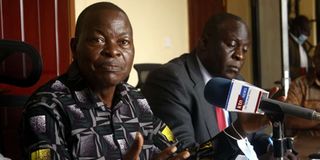Kuppet: Promotions favour teachers in national schools

Kenya Union of Post-Primary Education Teachers Secretary-General Akelo Misori (left) during a media briefing in Nairobi on February 10, where they called for fairness in TSC interviews. Right is Kuppet chairman Omboko Milemba.
What you need to know:
- The interviews started on Monday and are set to end on February 19.
- More than 33,000 teachers were shortlisted for the positions.
- Teachers qualifying for promotion must have served in the previous job group for a minimum of three years
A teachers’ union has alleged discrimination against thousands of its members in county and sub-county schools in promotion interviews.
The Kenya Union of Post-Primary Education Teachers claims that the scoring matrix and tools used by their employer disadvantage some tutors by placing more weight on their students’ performance as opposed to their individual qualifications.
Thus, the Teachers Service Commission score sheet favours tutors in extra-county and national schools as they usually perform well.
Kuppet secretary-general, Akelo Misori, on Wednesday said the Career Progression Guidelines (CPGs) and the Teachers Performance Appraisal Development (TPDS) being used place premium on the category of schools where the applicants serve and their performance.
“It is obvious that county and sub-county schools cannot compete fairly with the well-established ones. A glaring difference between the two categories of schools is in the entry qualifications for their form ones intakes,” said Mr Misori.
Kuppet wants all teachers to be allowed to compete fairly regardless of the performance of their schools. Mr Misori said interviews should only be based on the academic qualification of teachers and their competencies.
Three years
TSC introduced the CPGs in 2018 has been using them in promotions, a position strongly opposed by the Kenya National Union of Teachers, which has distanced itself from the 2017-2021 Collective Bargaining Agreement the bodies signed with TSC. Knut members have been left out of the promotions.
The scoring in the interviews is based on the teacher’s performance, the school mean grade in both school-based and national examinations, among other key indicators.
The commission is in the process of filling 15,726 vacancies for the positions of Deputy Principal I, Deputy Principal II, Senior lecturers, Deputy Principal II, Curriculum Support Officers, Head Teachers, Senior Master IV, Deputy Head Teacher II, Senior lecturer IV and senior Master IV.
The interviews started on Monday and are set to end on February 19. More than 33,000 teachers were shortlisted for the positions.
Teachers qualifying for promotion must have served in the previous job group for a minimum of three years and those applying for the Deputy Principal I were required to have served as Deputy Principal II or as senior master 1.
Deserved opportunities
Those seeking Deputy Principal II positions must have served as Deputy Principal III or Senior Masters II for a period of not less than three years. Senior lecturer I must have served as senior lecturer II for a minimum of three years while those seeking for Deputy Principal III must have served as Senior Masters III for not less than three years
The teachers must also hold a Bachelor of Education or Bachelor of Science or Arts degree plus a graduate diploma in Education. Teachers with master’s degrees were given first priority in the shortlisting. TSC also requires all of them to have satisfactory rating in the performance appraisal and performance contracting process. This requirement looks at the schools mean score where the teachers work.
“TSC is implementing a systematic policy to deny some teachers their deserved opportunities ostensibly based on the school size they teach,” said Mr Misori.
“Unless the interviews are modified, many qualified teachers including those with post-graduate qualifications the TSC initially asked for might not get their deserved promotion.”
Mr Misori said some principals, deputy principals and senior teachers from marginalised areas are being condemned to serve in the small schools for the rest of their lives. Some principals in sub-county and county schools were delocalised from national institutions, the commission could be “punishing teachers” who took up positions in marginalised areas, he added.





